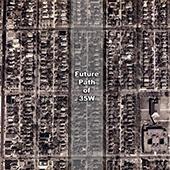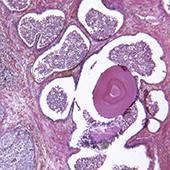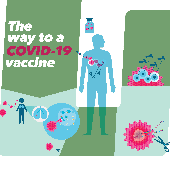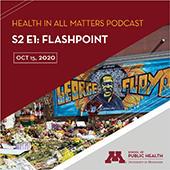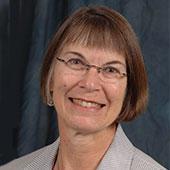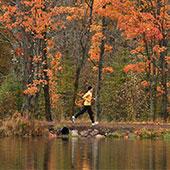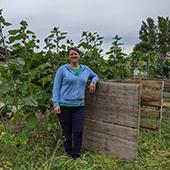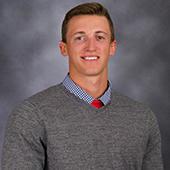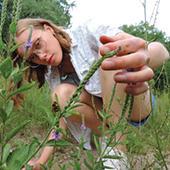- Features: The costs and consequences of progress; Spotting metastasis before it starts; From lab to community immunity.
- People: The U.S. Department of Defense has awarded $87.5 million to create a new Manufacturing Innovation Institute at the University of Minnesota; and more.
The costs and consequences of progress
Many people in the Twin Cities area know something about the history of Rondo—a primarily Black neighborhood in St. Paul that was demolished in the late 1950s and early ’60s to make way for the I-94 freeway. Fewer know about the history of I-35W in Minneapolis, but that’s something U of M professor Greg Donofrio and his students are working to change.
Spotting metastasis before it starts
Working with prostate cancer tissue, a University of Minnesota researcher has identified characteristics that separate cancer cells that are invasive—i.e., spreading in tissues of the original organ—from metastatic cells that are gearing up to seed new tumors in distant organs. The study, by researcher Akhouri Sinha, paves the way for pathologists and other physicians to more accurately assess a patient’s status and take appropriate measures.
From lab to community immunity
More than 100 vaccine projects in various stages across the globe take subtly different approaches to achieving the same goal: trigger the body’s immune response to COVID-19 before the virus has an opportunity to spread and cause harm. U of M experts explain three ways to create a COVID-19 vaccine and offer optimism about when we might have a viable option.
People
The U.S. Department of Defense has awarded $87.5 million to create a new Manufacturing Innovation Institute sited at the University of Minnesota; the Heinz Family Foundation has named Katy Kozhimannil the recipient of the 25th Heinz Award in the public policy category; a longtime friend of David Largaespada has made a $1.4 million donation to the Largaespada Lab at the Masonic Cancer Center; Daniel Weisdorf has received the 2020 Charles Bolles Bolles-Rogers Award from the Twin Cities Medical Society Foundation; Lynda Lahti Anderson and MacDonald Metzger have received a $277,792 grant from the U.S. Embassy Kinshasa; ESPN has named the U of M Twin Cities one of the top five Unified Sports schools in the country; U in the News features highlights of U faculty and staff cited in the media. People
Infrastructure bill supports U of M System
The Minnesota Legislature has passed a $1.36 billion infrastructure bill, including more than $75 million for the University of Minnesota System. The legislation funds asset repair and maintenance across the U of M System, replacement of the Child Development Building on the Twin Cities campus, renovation of AB Anderson Hall on the Duluth campus, and renovation of the Chemistry Undergraduate Teaching Laboratory on the Twin Cities campus. The legislation also provides the University with authority to refinance existing debt. See more details in the news release.
Illustrating Impact: U of M Public Engagement Footprint
The U of M Public Engagement Footprint is a new, user-friendly geospatial tool that graphically illustrates the University's community-engaged partnerships centered around learning, research, and outreach activities in Minnesota and beyond. Developed by the Office for Public Engagement in partnership with U-Spatial, the engagement footprint is designed to help faculty, staff, and students communicate the stories of the public impact of the University's community-engaged efforts.
BIPOC Faculty and Instructors Community survey and signup
Faculty and instructors that identify as Black, Indigenous, People of Color (BIPOC) or Asian American, Native Hawaiian, and Pacific Islander (AANHPI), including international faculty and instructors, are invited to join a systemwide online community that seeks to foster connection, professional development, and peer mentorship.
Nominations open: John Tate Award for Excellence in Undergraduate Advising
The Office of the Executive Vice President and Provost is pleased to sponsor the 2020-21 John Tate Awards for Excellence in Undergraduate Advising. By highlighting examples of outstanding advising, the Tate Awards identify professional models and celebrate the role that advising plays in the University's educational mission. Recognize excellent undergraduate academic and career advising by nominating a candidate for the Tate award. Nominations are due Jan. 5.
Administrative policy update
Like all administrative policies, the U of M’s policy on policy undergoes a comprehensive review every four years. The latest version of Establishing and Maintaining Administrative Policies reflects the practice of applying an equity lens when reviewing policies, allows for an extended timeframe for conducting a comprehensive review, and specifies the required review for alignment of administrative policies with Board of Regents policies. Comments are welcome during the 30-day review.
Preventing sexual harassment in higher education report released
The U of M is a member of the National Academies of Sciences, Engineering, and Medicine's Action Collaborative on Preventing Sexual Harassment in Higher Education, which has released its year one progress report including innovative work across 60 colleges, universities, and research organizations. The searchable repository includes descriptions of programs, policies, and practices institutions have developed to prevent and respond to harassment. The University continues to work towards moving beyond legal compliance to evidence-based policies and practices to address and prevent sexual harassment and promote a climate of dignity and respect.
Google rebrands G Suite as Google Workspace
Around January 2021, Google will be rebranding the G Suite for Education product that the University uses for Gmail, Calendar, Drive, etc. as Google Workspace. You may start to see Workspace branding in Google Support documentation and in the products themselves (especially in mobile apps) before January. Google Workspace will keep all of the apps that you use from G Suite, and will better integrate them with an accompanying refresh of icons and interfaces.
If not now, when? Racism: A 400-year public health emergency
The School of Public Health has published episode 1 in the second series of its Health In All Matters podcast. “Episode 1: Flashpoint” explores George Floyd’s death as one blow too many in a 400-year history of callous and inhumane treatment of Black Americans. The event sparked international outrage and to date, roughly 130 U.S. states, cities, and counties have declared racism a public health emergency. But what does an emergency really mean for an injustice that has been ongoing for centuries?
New research could help millions who suffer from ‘ringing in the ears’
In the largest clinical trial of its kind, researchers show that combining sound and electrical stimulation of the tongue can significantly reduce tinnitus, commonly described as “ringing in the ears.” They also found that therapeutic effects can be sustained for up to 12 months post-treatment. The findings could potentially help millions of people, since tinnitus affects about 10 to 15 percent of the population worldwide.
First responders using U of M app to manage compassion fatigue
First responders in all 50 states are now using an app designed by University of Minnesota researchers to help manage the emotional and physical exhaustion of their work. The First Responder Toolkit, created by College of Education and Human Development researchers in collaboration with the Minnesota Department of Health, provides an interactive platform to help a variety of professionals whose roles involve significant emotional investments in the management of compassion fatigue.
New NIH clinical trial tests a combination of drugs to treat COVID-19
A new National Institutes of Health clinical trial called ITAC is being conducted by the University of Minnesota School of Public Health. The trial will test the safety, tolerability, and efficacy of a highly concentrated solution of antibodies called hIVIG (hyperimmune intravenous immunoglobulin) that neutralizes SARS-CoV-2, the virus that causes COVID-19, when given with remdesivir compared to remdesivir alone.
Transformation in clinical education: Telehealth in the COVID-19 pandemic
The need for clinical education to train future health care professionals doesn’t stop during a pandemic. Learn how interprofessional collaboration was critical to the success of implementing telehealth as a new model for clinical education—and how years of anticipated growth were implemented within weeks as telehealth expanded and was adopted.
New findings about atherosclerosis identified in Medical School study
A study led by researchers in the Center of Immunology at the University of Minnesota Medical School has found new answers to one of the most common diseases in adults—atherosclerosis, or the build-up of fats, cholesterol, and other substances in and on the artery walls.
Research Brief: New global temperature data will inform study of climate impacts on health, agriculture
A new data set published in the journal Scientific Data provides high-resolution daily temperatures from around the globe that could prove valuable in studying human health impacts from heat waves, risks to agriculture, droughts, potential crop failures, and food insecurity. Additional recent Research Briefs include “Musical instruments don’t spread aerosols as far as you might think.”
U of M featured virtual events
Oct. 23 - Equity and Electrification of Transportation in Minnesota
Oct. 26 - Charting the Path to Health Equity: A 20/20 Review of the Political Determinants of Health
Oct. 27 - Savings = Planning for the Future
Oct. 28 - Webinar: Building Resilient Teams
Oct. 28 - Artist Talk by Brooks Turner | The Aesthetics of Fascism
Oct. 29 - Cultivating Resilience in Leaders: The Key to Transformational Leadership
Oct. 29 - James Ford Bell Lecture
Oct. 29 - Dance Theatre of Harlem Live Online Rehearsal & Artist Conversation
U.S. Department of Health and Human Services grant
The U.S. Department of Health and Human Services, Administration for Children and Families, has awarded White Earth Tribal and Community College (WETCC) a $500,000 grant (per year/five years). WETCC will partner with White Earth Head Start and the University of Minnesota Crookston to offer educational opportunities for Head Start staff to obtain their associate of arts degree with WETCC or a bachelor’s degree from the University of Minnesota Crookston.
Johnson joins Advisory Council on Climate Change
Governor Tim Waltz recently appointed Natural Resources Research Institute associate director and senior scientist Lucinda Johnson to his Advisory Council on Climate Change. Working with the Climate Change Subcabinet, the council provides input on reducing greenhouse gas emissions and promoting green economic opportunities in Minnesota. Johnson’s research includes assessing impacts of climate change on aquatic ecosystems in Minnesota lakes and streams.
Campus area part of Duluth Traverse
UMD’s Bagley Nature Area is now part of the Duluth Traverse, a trail system for runners, hikers, and mountain bikers. When it’s completed, the Duluth Traverse will span 100 miles and link existing trail centers at Lester Park, Hartley Nature Center, Piedmont/Brewer Park, Spirit Mountain, and Mission Creek Park. The UMD portion was finished this summer.
COVID uncertainty creates research opportunity
Like students around the country, Corbin McCall ’21 went home last spring when the COVID-19 pandemic hit. But instead of sitting back and waiting for things to return to normal, McCall and professor of statistics Engin Sungur tracked the virus’s nationwide spread. Read more in the Star Tribune story, “When COVID sent him home from school, school recruited him to work on the virus.”
Advancing access to fresh food
Rochester’s Village Community Garden and Learning Center (VCGLC) supported 120 diverse families and provided the UMR Student Food Pantry with 30 to 50 pounds of fruits and vegetables per week during the 2020 growing season. “In the span of two years, VCGLC has increased access to fresh, healthy, and culturally relevant foods for Rochester communities that currently have limited food access,” says UMR’s civic engagement scholar Angie Mejia.
UMR Career Pathways: Patient Care
With one focus and unlimited career possibilities, UMR's innovative and efficient degree programs provide students with a foundational undergraduate education in health sciences. Discover how Mackenzie Rahnenfuehrer navigated UMR’s many health career pathway opportunities with an individually planned capstone to prepare himself for the PharmD program at the University of Minnesota Duluth. Learn more about Rochester’s Patient Care pathway.
Extending opportunity: Being a bee campus
Through the efforts of Elaine Evans, University of Minnesota Extension educator, the University of Minnesota Twin Cities campus became a certified Bee Campus in 2020. As an official Bee Campus, Extension and several University colleges will highlight and expand efforts to promote pollinator conservation.
Libraries celebrates International Open Access Week
The University Libraries celebrates International Open Access Week this week with daily blog posts on issues related to opening access to research. This year's theme is: "Open with Purpose: Taking Action to Build Structural Equity and Inclusion.”
Switching to a plant-centered diet linked to reduced diabetes risk for young adults as they age
A plant-centered diet—or a diet emphasizing plant-source foods, such as fruits, nuts, and legumes with limited consumption of animal products—is an increasingly popular way to eat. A new study from the School of Public Health further supports the practice by finding that young adults who increased their plant-centered diet quality had a lower diabetes risk and gained less weight by middle adulthood.
Community protectors
In June, during the civil uprising following the killing of George Floyd, members of the American Indian Movement watched over the Phillips and Seward neighborhoods and protected neighborhood centers, including the University’s own Community-University Health Care Center.
U of M team identifying best practices to support Minnesota families during COVID-19
Katie Loth, Department of Family Medicine and Community Health, is leading a study to identify ways that public health practitioners and policymakers can support vulnerable Minnesota families. Loth is focusing on studying how the emergence of the COVID-19 pandemic has impacted the lives of a cohort of 80 families who live in the Twin Cities.
